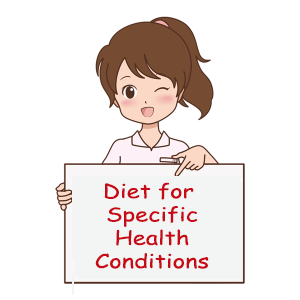DIETS FOR SPECIFIC HEALTH CONDITIONS
ANXIETY: Anxiety is a normal reaction when experiencing a painful situation, or when making a critical decision. But when emotions related to anxiety are overwhelming and interfere with your normal functioning and thinking; this is called “Anxiety Disorder“ a mental illness.
What to eat:
- Eat Tryptophan-Rich Foods – shellfish, oats, beans , bananas, milk, peanut butter, lentils, fish (tuna and salmon), chicken, turkey, cheese, soya (tofu and soya beans), seeds, and nuts.
- Eat Foods Rich in Vitamin B – beef, pork, lamb, green leafy vegetables, citrus fruits, nuts, and eggs.
- Eat Foods Rich in Vitamin B – beef, pork, lamb, green leafy vegetables, citrus fruits, nuts, and eggs.
- Eat Whole Wheat Bread.
- Eat foods rich in Omega -3 fatty acids.
- Consume High-Protein Foods
Foods to Avoid:
- Limit Coffee and caffeine containing drinks
- Limit sweets – like table sugar, honey and corn syrup
- Limit intake of Alcohol
- Limit processed foods such as hot dogs, sausage, pie, and cakes.
ATRIAL FIBRILLATION– is an abnormal heart rhythm characterized by irregular and fast heartbeats.
What to eat:
- Fruits
- Vegetables
- Whole Grains
- Fat-free or Low-fat dairy products
- More Fish
- Proteins – Emphasize white meat over red meat – choose lean cuts
What to avoid:
- Limit red meat- you can still have some on your diet, but choose lean cuts
- Avoid deep fried foods – limit saturated fat, and trans fat
- Eat less salt.
- Avoid caffeine.
- Limit alcohol consumption
CANCER:
What to eat:
- Foods rich in protein
- Fruits and vegetables
- Carbohydrates
- Fats (monounsaturated and polyunsaturated fats)
What to avoid:
- Fats (saturated and trans fat)
- Limit sweets
CELIAC DISEASE:
The primary and sole treatment for celiac disease is a gluten-free diet
What to avoid:
- Wheat
- Barley
- Rye
CHOLELITHIASIS (Gallbladder Stone)
What to eat in small frequent meals throughout the day:
- Foods rich in fiber
- Fruits
- Vegetables
- Increase your water intake
Foods to avoid:
- High-fat dairy foods (you can have low-fat dairy products)
- Fatty foods
- Fried foods
CROHN’s DISEASE: is an Inflammatory Bowel Disease (IBD), which causes inflammation of the stomach lining.
What to eat – easy to digest foods in small frequent meals.
⦁ Almond milk – contains no cholesterol or saturated fats
⦁ Aged Cheese (hard cheese) has less lactose
⦁ Low residue foods
⦁ Low Fiber Diet
⦁ Vegetable Soup
⦁ Increase fluid intake
⦁ Low-fat diet
⦁ Fruits like Papaya, Cantaloupe, Honey Dew Melon, Banana, and Mango
⦁ Cooked or steamed vegetables
⦁ Well-cooked and tender meat
Food to avoid: irritants and difficult to digest foods
⦁ Dairy products due to lactose intolerance
⦁ Nuts
⦁ Fruits with skin
⦁ Popcorn
⦁ Fried Food
⦁ Cured Meat
⦁ Seeds -avoid foods that contain lots of seeds, such as strawberries, raspberries, and tomatoes
⦁ Tomatoes
⦁ Coffee, chocolate, and carbonated beverages
⦁ Alcohol
⦁ Avoid grilled or roasted foods
CYSTIC FIBROSIS:
What to eat:
⦁ Extra fats
⦁ Extra calories
DIABETES:
⦁ Limiting foods that are high in sugar
⦁ Eat small frequent meals throughout the day
⦁ Calculate and watch your carbohydrates intake
⦁ Low-fat diet
⦁ Limit alcohol consumption
⦁ Low sodium diet – to lower the risk of high blood pressure
DIVERTICULITIS: inflamed pouches in the lining of the large intestine.
What to eat during the attack:
⦁ Water
⦁ Clear Broth
⦁ Ice pops
⦁ Clear fruit juices (avoid orange juice)
⦁ Jell-O
What to eat during recovery period:
⦁ Regular diet with low fiber and gradually change to a high fiber diet
High fiber-foods (fiber helps to soften the stool thus prevent constipation)
⦁ Whole-grain
⦁ Beans
⦁ Fresh fruits
⦁ Vegetables
Foods to avoid: (hard to digest foods)
⦁ Nuts and skin
⦁ Corn
⦁ Popcorn
⦁ Seeds and skin of fruits
HIGH BLOOD PRESSURE (Hypertension) – High blood pressure is a health condition in which the pressure of the blood against your artery walls is elevated that it may cause serious health problems; such as heart disease, heart attack, stroke or aneurysm
What to eat:
⦁ Eat foods that are rich in Potassium, magnesium, and fibers
⦁ Eat more fruits
⦁ Add more vegetables to your diet
⦁ Consume low-fat dairy foods like: low-fat and fat-free yogurt
⦁ Drink low-fat or skim dairy products
⦁ Increase consumption of fish, poultry, and nuts
⦁ Whole grains
⦁ Low sodium foods
What to avoid
⦁ Limit foods that are high in saturated fat, cholesterol, and trans fats
⦁ Limit sodium intake
⦁ Limit sweets, sugary drinks
⦁ Limit red meats
LIVER CIRRHOSIS
⦁ Low protein diet
⦁ Carbohydrate-rich foods
⦁ Low Sodium
⦁ Limit salt
⦁ Consume medium quantity of fats
RENAL FAILURE:
⦁ Limit protein
⦁ Limit Phosphorus
⦁ Limit sodium
⦁ Limit potassium
⦁ Limit amount of liquid intake every day
OSTEOPOROSIS – is a disease in which the bones become weak and brittle
Food to eat:
⦁ Calcium rich
⦁ Vitamin D rich
⦁ Magnesium rich
⦁ Potassium rich
⦁ Vitamin K rich
⦁ Vitamin C rich
⦁ Fruits
⦁ Whole Grains
⦁ Vegetables
Foods to avoid:
⦁ Extra amounts of Vitamin A
⦁ Salt
⦁ Soda
⦁ Caffeine
NOTE: you should be aware that some people might have to adapt their diet to their culture
***Many types of heart disease can be prevented or treated with a healthy lifestyle.
